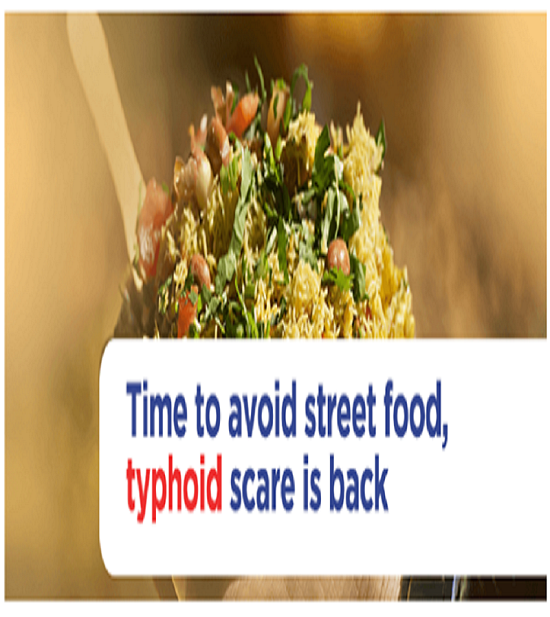
Time To Avoid Street Food, Typhoid Scare is Back
If you have a fever that starts low and rises daily, headache, weakness, fatigue, muscle aches, dry cough, loss of appetite and weight loss, seek medical advice immediately to check for the deadly fever.It is the time of year when people get sick due to polluted food and water. The explanation for the increase may be inadequate access to clean water and poor hygiene and sanitation. Typhoid fever is one of a number of fatal diseases, a life-threatening illness caused by the Salmonella typhi bacterium.
Typhoid is a bacterial infection which results in high fever, diarrhoea and vomiting. The infection is also spread by contaminated food and drinking water, or by close contact with an infected person. The symptoms may vary from mild to severe and develop within one to three weeks following exposure to the disease. It includes fever that begins from low to high, headache, weakness & fatigue, muscle aches, sweating, dry cough, loss of appetite, weight loss, abdominal pain, diarrhoea, rash and extremely swollen abdomen
A “binge” is the consumption of 4 to 5 drinks in 2 hours or less, which is very commonly being observed among youngsters these days. A word of caution for all the people partying out — watch your liver.
For certain cases, two weeks after fever has reduced, signs and symptoms will return. The symptoms will last for weeks or months, without adequate treatment.Some potential risks include heart muscle inflammation, heart and valve lining inflammation, tuberculosis, pancreatic inflammation, kidney or bladder infection, membrane infection and fluid covering the brain and spinal cord. Acute illness patients can contaminate the local water source by polluted stools, which contain a higher concentration of the bacteria. It does not spread out through the air (by cough) or by contact.
Even by following antibiotic therapy, patients recovering from typhoid fever would possibly tend to retain the bacteria in their intestinal tracts or gallbladders, sometimes for years. These people shed the bacteria in their faeces and can infect others, even though they do not exhibit signs or symptoms any more.To prevent typhoid fever two vaccines are available. The first is a Ty21a capsule which is given in 4 doses. It is a live vaccine, and can't be used in patients under 6 years of age or with weakened immune systems and those taking other medicines. This vaccine will last for 5 years. The other vaccine is Vi-shot. This is a killing vaccine which is ideal for children as young as 2 years and is safe for immuno-compromised patients.One should take proper preventive measures:
• Frequently wash your hands to manage and avoid infection before consuming or making food and after using the toilet.
• Do not drink untreated water because drinking polluted water in areas where typhoid fever is endemic will cause a problem. so, drink boiled water.
• Try to avoid raw fruits and vegetables which you cannot peel, especially lettuce.
• It is good to not eat food from street vendors as it is more likely to be contaminated.
• Manage proper sanitation and hygiene.
• If you are travelling to prevalent areas, consult your health care provider and ask if you need to take typhoid fever vaccination.